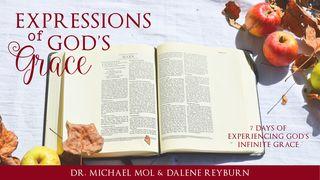Our Daily Bread - Spiritual Life BasicsSample

This wellspring of God’s love was never intended to be experienced for our own benefit alone. It is to spill over in sharing the good news of Christ’s redeeming love with others. It means being a joyful witness to what has happened in us.
I. Tapping into God’s Power
A witness is someone who can bear testimony to something they have seen, heard, or felt. In our legal system, a witness is brought into court to share what they know through personal experience. This term is used in Christ’s admonition to us.
Just before He returned to Heaven, Jesus told His disciples,
“But you shall receive power when the Holy Spirit has come upon you; and you shall be witnesses to Me in Jerusalem, and in all Judea and Samaria, and to the end of the earth” (Acts 1:8 NKJV).
But being a witness for Christ does not mean merely telling others what we have experienced. Our Lord promised us the Holy Spirit in order to provide a divine empowerment to what we share. The Holy Spirit is the third Person of the Trinity. When a person trusts Christ as Savior, the Holy Spirit comes to live within and will abide with him forever (John 14:16; Ephesians 1:13; 4:30, 2 Corinthians 1:22). However, it is possible to have the Holy Spirit inside us without letting Him empower your life. That is why we are admonished to “be filled with the Spirit” (Ephesians 5:18). This occurs when we confess all known sin, ask God’s forgiveness, and yield our hearts to Him (1 John 1:9). An attitude of dependence should then follow in which we “walk in the Spirit” allowing God’s Spirit to live the Christian life through us (Galatians 5:16).
It is essential that we are filled with the Spirit before sharing the good news with an unbeliever. What does it mean to witness? It is simply caring enough to share the good news that Jesus came to redeem us from the power of sin and to restore us to relationship with God.
There’s a great verse in Paul’s letter to the church at Corinth that tells us how simple the message of the gospel is:
“For I delivered to you first of all that which I also received: that Christ died for our sins according to the Scriptures, and that He was buried, and that He rose again the third day according to the Scriptures” (1 Corinthians 15:3-4 NKJV).
But how do we go about sharing this great truth with others? Here are just a few alternatives.
II. Sharing Your Own Story
If you are a Christian today, there was a time in your life when you were not. Think about how your life has changed since you were spiritually born into the family of God. Write down some thoughts about what your life was like before Christ and what it is like now that you know Him. Think about the decision-making process you went through in responding to His invitation to new life and write that as well. Read it over and know it well enough that you could spontaneously and comfortably tell someone about how knowing Jesus has changed you.
Every believer has a unique story of encountering Christ. Ann, a receptionist at a Christian organization, has kept a journal for much of her life. She treasures the account she recorded about her conversion when she was 15. Here is an excerpt. “[I] went to see Billy Graham. I got saved! I’m very happy. . . . When I got saved I felt warmth in my heart.”
A professor at a Bible school taught a personal evangelism course to freshman. He asked the students to write out their stories of how they came to faith in Christ. It struck him how different each journey was. Some were saved out of a life of drugs and immorality. Others were church attendees who came to Christ after years of biblical instruction.
Conversions vary. The apostle Paul had a crisis encounter with the Savior that turned him from a persecutor into a preacher of the gospel (Acts 26). In contrast, Timothy was quietly nurtured in the Scriptures from early childhood, resulting in his salvation experience (2 Timothy 3:14-15). No two faith journeys are identical. But each has the common element of turning to the Lord Jesus in faith to be saved from sin and to receive a new heart.
Can you retrace the steps that God helped you take in coming to Christ? What’s your story? Jot it down in line form and mentally rehearse telling it to someone who wants to listen.
III. A Simple Presentation of the Gospel
As important as telling our own story is, we also need an organized way of sharing the essentials of the gospel with someone. A simple presentation that many have used is called “The Romans Road.” In the ancient world, a vast extended system of roads had been constructed by the Roman Empire. No matter how far from Italy a road may have been, it was said, “All roads lead to Rome!” The reason for this saying was that it could be followed to the Imperial City.
Interestingly, the New Testament book of Romans has sufficient Bible truths that can be cited to clearly explain the gospel. Using verses in this book to explain how to receive Christ’s gift of salvation has been called “The Romans Road.” Let’s examine one version of this evangelistic tool.
[Note: You can actually mark each verse in your own Bible with a one or two-word description to remind you of what the verse represents. See those words or phrases in italics below. Example: Print sin in the Bible margin near
Romans 3:23.]
The first verse on the Romans Road to salvation is Romans 3:23, which speaks of sin: “All have sinned and fall short of the glory of God.” We have all sinned. We have all done things that are displeasing to God. Despite our best efforts, each of us has failed to consistently live up to God’s perfect moral standard.
The second Scripture on the Romans Road to salvation, Romans 6:23, tells us of sin’s penalty: “The wages of sin is death.”
The punishment we deserve for our sins is death. Not just physical death, but eternal separation from God.
The third verse on the Romans Road to salvation is the second part of Romans 6:23, which speaks of God’s gift: “The gift of God is eternal life in Christ Jesus our Lord” (NKJV).
Romans 5:8 declares, “God demonstrates His own love toward us, in that while we were still sinners, Christ died for us” (NKJV).
Jesus Christ died for us, paying the penalty for our sins. Jesus’ resurrection demonstrated that God accepted Jesus’ death as the payment for our sins and the basis for our being declared not guilty before Him.
The fourth verse on the Romans Road to salvation is Romans 10:9, which tells us how we receive the gift: “If you confess with your mouth the Lord Jesus and believe in your heart that God has raised Him from the dead, you will be saved” (NKJV).
Because of Jesus’ death on our behalf, we must repent of our sin and trust in Christ alone for our salvation. Romans 10:13 says, “Whoever calls on the name of the Lord shall be saved” (NKJV). Salvation is available to all who repent and trust in Jesus Christ as their Savior and Lord.
The final aspect of the Romans Road to salvation is the results of salvation. Romans 5:1 tells us: “Therefore, having been justified by faith, we have peace with God through our Lord Jesus Christ” (NKJV). Through Jesus Christ we can have a relationship of peace with God.
Romans 8:1 proclaims, “There is therefore now no condemnation to those who are in Christ Jesus” (NKJV). Because of Jesus’ death on our behalf, we will never be condemned for our sins.
If a person understands the gospel and wishes to respond to Christ for salvation, a simple prayer can be a means of expressing faith in Jesus Christ. Here is a prayer that someone might use: “Lord Jesus, I need you. Thank you for dying on the cross to pay the penalty for my sin. I open the door of my life and receive you as Savior and Lord. Take the throne of my life and make me the kind of person you want me to be.”
Scripture
About this Plan

The New Testament challenges each of us to “grow in the grace and knowledge of our Lord and Savior Jesus Christ” (2 Peter 3:18). What does this mean and how do we do this? The Spiritual Life Basics reading plan helps you learn how to develop and grow in your relationship with Jesus. Begin growing in the grace and knowledge of Jesus Christ today!
More









